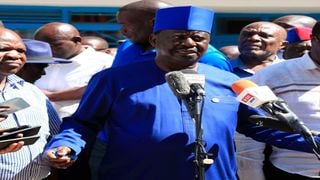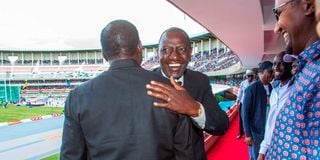
Azimio leader Raila Odinga addresses journalists at Mama Grace Onyango Social Hall in Kisumu on Thursday May 25. The opposition chief has started a five-day countdown to deadline issued to President William Ruto on bipartisan talks.
| Ondari Ogega | Nation Media GroupPolitics
Premium
Raila Odinga, a man who never learns from mistakes
Opposition leader Raila Odinga, the enigma of Kenya’s politics with a career spanning more than three decades, including five failed presidential attempts, has a political life marred by a series of recurring blunders that suggest a man who does not learn from his mistakes.
Mr Odinga and his Azimio coalition colleagues now find themselves being taken in circles by the government side at talks on the post-election crisis he triggered after denouncing President William Ruto’s administration, rekindling his frustrations during similar negotiations with past presidents.
Bungled party primaries flagged every election even by internal probes, chaotic campaign machinery, botched deployment of poll agents and mismanaged election tallying centres are among repeated shortcomings that have taken the 78-year-old Orange Democratic Movement (ODM) leader down an infamous road that has inevitably ended up in post-election lamentations.
And like in past post-election talks in which he made concessions only to be shortchanged, the latest case is the revelation that the electoral agency selection panel—at the heart of his post-election stalemate with President William Ruto—has been going on with its work unperturbed, even as Mr Odinga lists the reconstitution of the poll referees as an “irreducible minimum”.
Saturday Nation has established that the Independent Electoral and Boundaries Commission (IEBC) selection panel chaired by Dr Nelson Makanda has been meeting, laying bare the growing perception the ruling coalition has been using the talks as a means to manage the opposition leader.
The Saturday Nation front page.
The panel had its last meeting on Friday, according to Dr Makanda, who confirmed that they are on with the recruitment of the seven electoral commissioners. Sources on the panel disclosed that the committee has been holding virtual meetings at least once a week. They have, however, not held a physical meeting since the talks began.
Mr Odinga’s side has insisted that the refusal by Dr Ruto to formally suspend the panel is a sign of non-committal to the talks. It is one of the reasons the camp has suspended the talks and given the government side a seven-day ultimatum.
Committee co-chair Otiende Amollo (Rarieda, ODM) alleged a sinister motive in keeping the panel in office. But his co-chair, George Murugara (Tharaka, UDA), said it was “just out of goodwill” that they had asked the panel to go slow with the recruitment even as he added they have no powers to suspend its mandate. Mr Odinga had demanded a stop to the hiring of new IEBC commissioners as a condition for calling off anti-government protests.
Vulnerable
This revelation has exposed how Mr Odinga has always remained vulnerable and ended up with the short end of the stick in his post-election negotiation deals since 2008. It also gives credence to previous remarks by some of his current and former allies that portray him as a weak negotiator, including in the 2008 post-election deal with then President Mwai Kibaki on the sharing of Cabinet portfolios.
Dr Ruto has not yielded to any of the demands by Mr Odinga nearly two months since he first called off the protests to give the talks a chance. This mirrors previous negotiations where Mr Odinga agreed to talks but ended up being shortchanged.
In his autobiography, Stronger Than Faith: My Journey in the Quest for Justice, ODM director Oduor Ong’wen narrates how Mr Kibaki stood his ground on the sharing of Cabinet slots. At the end of the talks, Mr Odinga got a raw deal.
“Practically, the requirement meant that Cabinet positions had to be shared between ODM and PNU on a 50-50 basis. We proposed that in establishing the balance, the ministries be classified into four categories…the Kibaki side would hear none of this, insisting on keeping those it had already distributed in January,” he narrates.
“While Kibaki and his PNU insisted on expanding the Cabinet to accommodate ODM, we wanted a smaller Cabinet of between 20 and 25 ministries. At the end of the day, Kibaki had his way. PNU retained the more powerful portfolios and the Cabinet was bloated to 40 ministries.”
This week, Dr Makanda told Saturday Nation that the panel’s mandate can only be suspended through a change of law by Parliament or through a court order. He, however, added that his team was conscious of the talks between the Azimio la Umoja One Kenya coalition and the ruling Kenya Kwanza Alliance.
“We are still on with the recruitment, but we are also conscious of the bipartisan talks. Our mandate can only come to an end once we are through with the recruitment, which is at the point of swearing in the new commissioners, if there is a court order or if there is a change in law, which can only be done by Parliament,” said Dr Makanda.
He disclosed that there was no official communication asking them to put the recruitment on hold. This confirmation by the panel contradicts assurances by the Kenya Kwanza team in the talks that the recruitment had been officially suspended by the President.
A total of 215 applicants had expressed interest in replacing former IEBC chairman Wafula Chebukati, while another 895 applied for the six vacant commissioner positions.
A source on the panel said the team had its last physical meeting just before Dr Ruto and Mr Odinga agreed to the 14-member bipartisan team. The panel had started shortlisting applicants, ready for interviews.
Dr Amollo said Kenya Kwanza had told them that the President had ordered the panel to stop the recruitment. He said they asked their counterparts that the bipartisan team formally pronounce itself on ending the mandate of the panel, but Kenya Kwanza refused.

President William Ruto and Rt. Hon Raila Odinga at Kipkeino Classic at Moi Sports Center Kasarani.
“Both parties identified IEBC reconstitution as an issue and have a view on how it can be done. We asked our colleagues that we, by consent, stop the recruitment. The response by Kenya Kwanza was that the executive had stopped the process,” said Dr Amollo.
“We asked them what would be the harm if the committee pronounced itself on the matter and officially communicated that recruitment has been stopped. They refused. As things stand, the team can just decide to continue with the recruitment. They can go on anytime in the absence of any formal communication.”
In a statement, Azimio on Wednesday expressed their frustrations at the negotiations, lamenting how the ruling alliance has rejected all the “desired preliminary actions”.
“Going by this established principle in negotiations, our delegation asked that there be some preliminary actions … suspension of the selection panel of IEBC in light of the fact that it is an agenda of the talks. Unfortunately, our team met resistance, hostility and outright rejection on all the desired preliminary actions,” the coalition said.
Mr Murugara, in a letter to Dr Amollo, dated May 25, agreed to jointly engage the selection panel to suspend the recruitment for at least 30 days to allow discussion on IEBC reconstitution. He said their refusal to order the suspension of the committee was premised on the fact the bipartisan committee had yet to be recognised by Parliament.
“There is a law in force and this committee could not be seen to suspend the operation of law. In any event, we informed the committee that out of good faith and to give room to this committee to fully delve into deliberation on all IEBC issues, the Kenya Kwanza side had confirmed that the selection panel would be held in abeyance pending the talks.
“However, I would propose that the two of us as co-chairpersons engage the selection panel and, even if it is in writing, request them to consider suspending their work for about 30 days as the talks go on,” Mr Murugara suggested in a perceived attempt to stop the opposition from resuming street protests.
Should the talks collapse with Mr Odinga failing to push through any of his demands, it would add to the long list of instances where he has ended up disappointing his supporters. He has, in several instances, built hope among his supporters both in the run-up to the election and in the push for reforms after failed presidential bids.
In the last four successive disputed elections that Mr Odinga has emerged second, losing narrowly to Mr Kibaki in 2007, Mr Uhuru Kenyatta in 2013 and 2017, and in 2022 where he lost to Dr Ruto, accounts by his allies have revealed repeated mistakes. His attempts to push for reforms in both his ODM party and at the electoral commission have also not yielded the desired outcome
His script has always remained the same—forming a task force to end the bungling of party primaries, talking of hiring agents in every polling station and putting in place a parallel tallying centre to counter possible rigging. His decision to go to the Supreme Court and eventually call for street protests has since become predictable.
In 2017, the Supreme Court annulled Mr Kenyatta’s re-election. Mr Odinga, however, did not participate in the rerun, choosing instead to swear himself in a mock exercise before having a deal with Mr Kenyatta.
Mr Odinga’s chief agent in the August 9 polls, Mr Saitabao ole Kanchory, in his recently released book, Why Baba is not The 5th, describes what was the coalition’s election command centre as a tower of babel. “The confusion at the command centre had been made worse by endless infighting and internal wrangles within the Azimio family. These turf wars found their way into the sensitive issue of agents, with every Azimio strongman and woman insisting they must be the ones to provide the list of presidential agents.”
Chaotic command centre
Last year, a top operative in the Raila 2022 campaign revealed how a Cabinet Secretary, a Principal Secretary and one of Mr Odinga’s closest allies bungled an otherwise seamless plan on agents, with an earlier plan on deployment and payment rejected at the last minute giving way to a chaotic, disorganised one that saw agents deployed as late as the date of the election. Mr Odinga would later rely on a whistleblower as the basis for his rejection of Dr Ruto’s win, suggesting the coalition’s parallel tallying centre was of little help.
It was not different in 2013 and 2017, when the Coalition for Reforms and Democracy (Cord) and the National Super Alliance (Nasa), respectively, could not make public their figures in disputing Mr Kenyatta’s win.
Similarly, after the bungled 2017 party primaries, ODM formed a five-member team that comprised Catherine Mumma (now nominated senator), Prof. Lawrence Gumbe, Alfelt Mumbo Abio-Gunda and Irshad Sumra to review the previous election cycle and provide a path to more credible party primaries.
“Party elections are thought to lack credibility and do not meet the standard of being free, fair and democratic,” the report read.
But even with the report and Ms Mumma picked as the chair of the election’s board, ODM nominations were still rocked by claims of rigging. Its chairman, John Mbadi, is on record saying the 2022 primaries were worse than the previous ones.
“After 2017, we discovered that there were messes and we constituted a task force. Recommendations of that task force were given to the same chair of the task force to implement. Her tenure was worse than that of [Judith] Pareno,” he was quoted as saying early this year.





